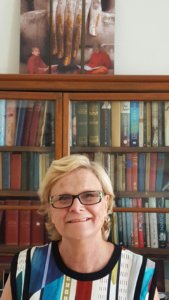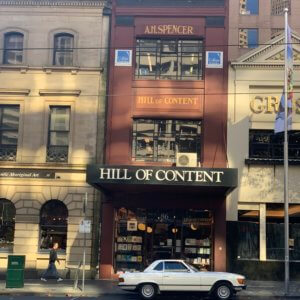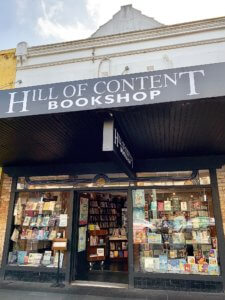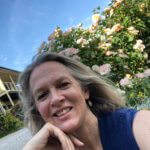
‘The ability of the writer to give the reader knowledge and an understanding of our past, but at the same time entertain with a gripping story, makes an outstanding historical novel.’
What happier circumstance than time spent browsing in a bookshop? Imagine our delight when Diana Johnston, co-owner of the iconic Hill of Content bookshops and National Buyer for Collins bookstores responded so enthusiastically about participating in the HNSA ‘What historical fiction means to me’ series of interviews. Read on to hear more about Diana’s views on the appeal of historical fiction, not to mention her plans for promoting historical fiction in future.
In your opinion as a bookseller, what is historical fiction’s particular appeal?
There is a broad group of readers who enjoy historical fiction. All of these people have some interest in our past. For some readers the historical context simply colours the story and helps create a romantic atmosphere of a bygone era. Other readers yearn to learn about historical events but are not prepared to wade through dry history books to gain this knowledge. Historical fiction is a great medium through which people can gain an insight of our past without the hard work of studying an era.
Carefully researched Historical fiction provides essential information about a particular period in our history, whilst at the same time offering an imagined insight into what the key figures may have thought at the time and recreating the environment in which the historical events took place. This way the lay reader can put themselves into the context of the story and it becomes more relevant for them.
How do you think a prize such as the ARA Historical Novel Prize helps to raise the profile of historical fiction in general?
The ARA Historical Fiction Prize will recognise this genre in the literary world as worthy of a genre in its own right. Too often historical fiction is catalogued with general fiction and even sometimes placed in the fantasy section.

How do you catalogue historical Fiction in your store? Do you ever promote an ‘historical fiction’ category on your shelves?
Generally historical fiction falls into the general fiction area, but now you have drawn my attention to this, we will create an appropriate section in the months to come. I will also encourage the other Collins’ stores in our group to do this as well.
Which sub-genre of historical fiction are you pleased to see is eligible, and why do you feel it’s important?

I think it’s tremendous that children’s historical fiction is eligible. It plays an important role in giving our young readers an appreciation of the past. By presenting historical facts in story form, children can relate to the characters and understand that although these people lived in a bygone era, they were really just like us, trying to get by often in difficult circumstances – they too had hopes, fears and dreams for the future.
What do you think makes a standout historical novel?
I believe that the most important feature of an historical novel is that it accurately presents the facts or represents events as they happened. The characters may be fictitious or may have their own view on a situation but overall the historical aspects of the novel must be thoroughly researched. The ability of the writer to give the reader knowledge and an understanding of our past but at the same time entertain with a gripping story, makes an outstanding historical novel.
More about Diana
Diana Johnston is the National Buyer for Collins Booksellers and co-owner of the Hill of Content Bookstores in Melbourne and Sydney. She has a degree in mathematics and history, and a background in teaching. Diana has been working in the book industry for many years initially owning and operating Collins Booksellers, Bairnsdale, which later included the Paper Chase Café. She has a passion for reading, and shares her time with husband Duncan and family both in Melbourne and beautiful East Gippsland.

This interview was compiled by HNSA Marketing Coordinator, Lou Greene. Lou was winner of the HNSA First Pages Pitch in 2017 and she long-listed in the Richell Awards. Last year, as well as being short-listed in the HNSA short story competition, she was a recipient of an ASA Mentorship Award. Lou has an MA Modern History and has recently completed a dual timeline, novel manuscript. Find out more about Lou’s writing from her website, or connect with her via Instagram or Twitter.

The ARA Historical Novel Prize, for published historical novels by Australian and New Zealand authors, will be worth $30,000 to the winning author. With entries opening on May 1, it is a partnership between generous sponsor, the ARA Group, and the Historical Novel Society Australasia (HNSA), in association with the New England Writers’ Centre. HNSA is delighted and proud to introduce this initiative, which celebrates the diversity and strength of an increasingly popular and acclaimed genre.




